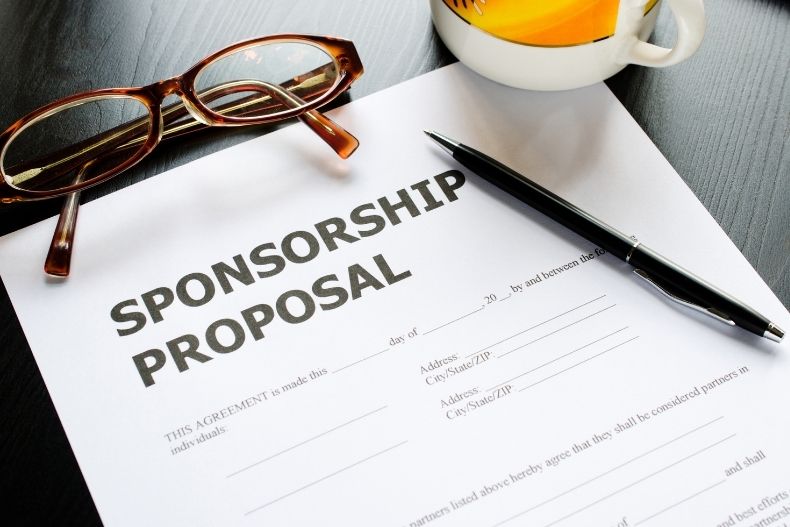If you plan on hosting an event, you are probably facing one important problem: how to fund it? Big corporations and renowned companies may have lavish marketing budgets — but smaller businesses will likely need some help. One great option is sponsorships. According to Statista, global sponsorship spending was $65.8 billion in 2018, and as virtual events become increasingly popular, event sponsorship is becoming even more important in funding events.
But while sponsorships are an amazing financing option, finding a sponsor can be quite tough. In fact, the process is similar to when you’re trying to get hired for a job position – many of your proposals will get no response or end up rejected. Fortunately, there are several tips that can help you create an effective sponsorship strategy.

Write a Winning Sponsorship Proposal
A strong sponsorship proposal presents your event and opportunities for sponsorship in a well-thought-out, organized manner. This proposal should contain enough details for the potential sponsor to gain an understanding of what is being offered and the benefits their company will receive in return. Getting all the preliminary conversations in writing will ensure that the most important points are covered while at the same time demonstrating your dedication and competence.
You can write your proposal from scratch or, even better, use a sponsorship proposal template that offers a simpler way to create a professional sponsorship request.
When writing your proposal, come prepared with data including:
- Audience demographics. Potential sponsors will want to know basic info about their audience such as gender, age, location, but you can also add more details such as job title, education level, income, which social media channels they use, etc.
- Ticket sales. Demonstrate how many people your potential sponsor could reach.
- Social media activity. Track where, when, and how frequently your event is mentioned on social media, news sites, blogs, and websites.
- Information about media and vendors at your event, and which audiences they appeal to.
Choose the Best Sponsors
Start by putting together a list of individuals and companies that may be interested in sponsoring your event. The best sponsors are those that would have a direct benefit from your event and your target audience. Make sure to conduct thorough research that includes the potential sponsors’ marketing goals, sales, their products and services, as well as any events they have sponsored in the past.
Consider reaching out to sponsors from related events, i.e. sponsors who already work with events in your industry. These organizations already understand what the benefits of sponsoring events are and they are very likely to keep investing in this type of marketing.
You can also use digital tools such as Sponeasy, OpenSponsorship, and SponsorMyEvent to find sponsors for your next event.
Offer Incentives for the Sponsor
Sell your potential sponsors on why they should participate. Will your event be attended by their potential customers? How will you help promote their business to your audience? What perks will they receive for participating?
In general, sponsorships are give-and-take relationships, so consider offering your potential sponsors incentives such as giving them a free booth for trade shows or exhibitions, placing the sponsor’s logo or name on event promotional materials (flyers and banners), mentioning the sponsor’s company in your social media posts, blog posts, and email newsletters or even giving event-related swag bags or discounts to customers that are willing to purchase the sponsor’s product.
If you are willing to give more than you take, it shows that you are serious about making the event a success.
Build Long-Term Relationships with Sponsors
Be sure your sponsor’s needs are satisfied in order to ensure that they will come back to support your next event. Use the following list to strengthen your relationships with sponsors.
- Once your sponsorship proposal has been accepted, create a checklist that will help you keep all the promises you’ve made.
- Keep your sponsor involved and informed in all activities leading up to the event. Brief emails and meetings are perfect as they show that you respect them but you don’t want to waste their time.
- Be flexible. If the sponsor requests a small adjustment to your event plans without any cost to you, accept it with a smile.

After the Event
Let your sponsors know that their return on investment for sponsoring your event is very important for you and make sure that they’re included in your post-event evaluation. Share data about the results of sponsoring your event (brand mentions, leads generated, sales, impressions gained, etc).
Ask their opinion about the event: What was good, what worked for them, and most importantly, what could be improved in the future. Don’t forget to send your sponsors small gifts or thank-you cards and invite them to your upcoming events.
Final Thoughts
Sponsorships are a vital funding source for different types of events, ranging from non-profit galas and music festivals to trade shows. These 5 tips will help you attract sponsors for your next event and secure a sponsorship that offers benefits for both your company and your contributors.